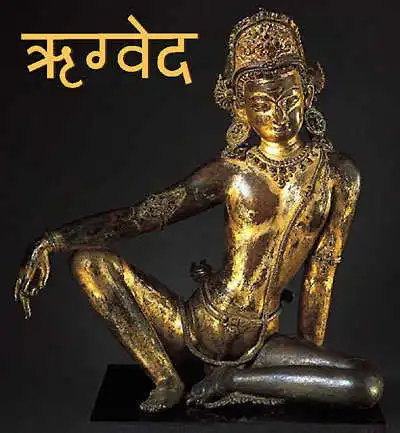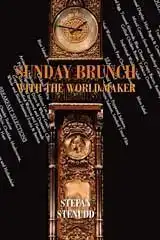|
|
|
|
|
|
|
Nor aught nor naught existed; yon bright sky was not, nor heaven's broad woof outstretched above. What covered all? what sheltered? what concealed? Was it the water's fathomless abyss? |
The non-existent was not, the existent was not; then the world was not, nor the firmament, nor that which is above (the firmament). How could there be any investing envelope, and where? Of what (could there be) felicity? How (could there be) the deep unfathomable water? |
THEN was not non-existent nor existent : there was no realm of air, no sky beyond it. What covered in, and where? and what gave shelter? Was water there, unfathomed depth of water? |
Non-being then existed not nor being: There was no air, nor sky that is beyond it. What was concealed? Wherein? In whose protection? And was there deep unfathomable water? |
Then even nothingness was not, nor existence. There was no air then, nor the heavens beyond it. What covered it? Where was it? In whose keeping? Was there then cosmic water, in depths unfathomed? |
There was neither non-existence nor existence then; there was neither the realm of space nor the sky which is beyond. What stirred? Where? In whose protection? Was there water, bottomlessly deep? |
The non-existent did not exist, nor did the existent exist at that time. There existed neither the midspace nor the heaven beyond. What stirred? From where and in whose protection? Did water exist, a deep depth? |
There was not death — hence was there naught immortal, There was no confine betwixt day and night; The only One breathed breathless in itself, Other than it there nothing since has been. |
Death was not nor at that period immortality, there was no indication of day or night; THAT ONE unbreathed upon breathed of his own strength, other than THAT there was nothing else whatever. |
Death was not then, nor was there aught immortal : no sign was there, the day's and night's divider. That One Thing, breathless, breathed by its own nature : apart from it was nothing whatsoever. |
Death then existed not nor life immortal; Of neither night nor day was any token. By its inherent force the One breathed windless: No other thing than that beyond existed. |
Then there were neither death nor immortality, nor was there then the torch of night and day. The One breathed windlessly and self-sustaining. There was that One then, and there was no other. |
There was neither death nor immortality then. There was no distinguishing sign of night nor of day. That one breathed, windless, by its own impulse. Other than that there was nothing beyond. |
Death did not exist nor deathlessness then. There existed no sign of night nor of day. That One breathed without wind through its inherent force. There existed nothing else beyond that. |
Darkness there was, and all at first was veiled in gloom profound, — an ocean without light. — The germ that still lay covered in the husk burst forth, one nature, from the fervent heat. |
There was darkness covered by darkness in the beginning, all this (world) was undistinguishable water; that empty united (world) which was covered by a mere nothing, was produced through the power of austerity. |
Darkness there was : at first concealed in darkness this All was indiscriminated chaos. All that existed then was void and formless : by the great power of Warmth was born that Unit. |
Darkness there was at first by darkness hidden; Without distinctive marks, this all was water. That which, becoming, by the void was covered, That One by force of heat came into being. |
At first there was only darkness wrapped in darkness. All this was only unillumined water. That One which came to be, enclosed in nothing, arose at last, born of the power of heat. |
Darkness was hidden by darkness in the beginning; with no distinguishing sign, all this was water. The life force that was covered with emptiness, that one arose through the power of heat. |
Darkness existed, hidden by darkness, in the beginning. All this was a signless ocean. When the thing coming into being was concealed by emptiness, then was the One born by the power of heat. |
Then first came Love upon it, the new spring of mind — yea, poets in their hearts discerned, pondering, this bond between created things and uncreated. |
In the beginning there was desire, which was the first seed of mind; sages having meditated in their hearts have discovered by their wisdom the connexion of the existent with the non-existent. |
Thereafter rose Desire in the beginning, Desire, the primal seed and germ of Spirit. Sages who searched with their heart's thought discovered the existent's kinship in the non-existent. |
Desire entered the One in the beginning: It was the earliest seed, of thought the product. The sages searching in their hearts with wisdom, Found out the bond of being in non-being. |
In the beginning desire descended on it — that was the primal seed, born of the mind. The sages who have searched their hearts with wisdom know that which is, is kin to that which is not. |
Desire came upon that one in the beginning; that was the first seed of mind. Poets seeking in their heart with wisdom found the bond of existence in non-existence. |
Then, in the beginning, from thought there developed desire, which existed as the primal semen. Searching in their hearts through inspired thinking, poets found the connection of the existent in the non-existent. |
Comes this spark from earth, piercing and all-pervading, or from heaven? Then seeds were sown, and mighty power arose — nature below, and Power and Will above. |
Their ray was stretched out, whether across, or below, or above; (some) were shedders of seed, (others) were mighty; food was inferior, the eater was superior. |
Transversely was their severing line extended : what was above it then, and what below it? There were begetters, there were mighty forces, free action here and energy up yonder. |
Their ray extended light across the darkness: But was the One above or was it under? Creative force was there, and fertile power: Below was energy, above was impulse. |
And they have stretched their cord across the void, and know what was above, and what below. Seminal powers made fertile mighty forces. Below was strength, and over it was impulse. |
Their cord was extended across. Was there below? Was there above? There were seed-placers; there were powers. There was impulse beneath; there was giving-forth above. |
Their cord was stretched across: Did something exist below it? Did something exist above? There were placers of semen and there were powers. There was inherent force below, offering above. |
Who knows the secret? who proclaimed it here, whence, whence this manifold creation sprang? — The gods themselves came later into being. — Who knows from whence this great creation sprang? - |
Who really knows? who in this world may declare it? whence was this creation, whence was it engendered? The gods (were) subsequent to the (world's) creation; so who knows whence it arose? |
Who verily knows and who can here declare it, whence it was born and whence comes this creation? The Gods are later than this world's production. Who knows then whence it first came into being? |
Who knows for certain? Who shall here declare it? Whence was it born, and whence came this creation? The gods were born after this world's creation: Then who can know from whence it has arisen? |
But, after all, who knows, and who can say whence it all came, and how creation happened? The gods themselves are later than creation, so who knows truly whence it has arisen? |
Who really knows? Who will here proclaim it? Whence was it produced? Whence is this creation? The gods came afterwards, with the creation of this universe. Who then knows whence it has arisen? |
Who really knows? Who shall here proclaim it? — from where was it born, from where this creation? The gods are on this side of the creation of this world. So then who does know from where it came to be? |
He from whom all this great creation came. Whether his will created or was mute, the Most High seer that is in highest heaven, he knows it, — or perchance e'en He knows not. |
He from whom this creation arose, he may uphold it, or he may not (no one else can); he who is its superintendent in the highest heaven, he assuredly knows, or if he knows not (no one else does). |
He, the first origin of this creation, whether he formed it all or did not form it, whose eye controls this world in highest heaven, he verily knows it, or perhaps he knows not. |
None knoweth whence creation has arisen; And whether he has or has not produced it; He who surveys it in the highest heaven, He only knows, or haply he may know not. |
Whence all creation had its origin, he, whether he fashioned it or whether he did not, he, who surveys it all from highest heaven, he knows — or maybe even he does not know. |
Whence this creation has arisen — perhaps it formed itself, or perhaps it did not — the one who looks down on it, in the highest heaven, only he knows — or perhaps he does not know. |
This creation — from where it came to be, if it was produced or if not — he who is the overseer of this world in the highest heaven, he surely knows. Or if he does not know... ? |
How stories of the beginning began.
Theories through history about myth and fable.
The mythological symbols and what they stand for.
Patterns of creation.
The paradox of origin, according to an Indian myth.
The first creation story of the bible scrutinized.
The ancient Babylonian creation myth.
The insoluble solitude of gods and humans.
What Sigmund Freud and C. G. Jung thought about myths, their origins and meanings.
Joseph Campbell, Jordan B. Peterson and other Jungians on mythology and religion.
An introduction to the subject of creation myths and the patterns of thought they reveal.
What the Greek philosophers believed about the cosmos, their religion and their gods.
The many ancient and modern life force beliefs all over the world explained and compared.
Taoism, the ancient Chinese philosophy of life explained. Also, the complete classic text
online.
I'm a Swedish author and historian of ideas, researching the thought patterns in creation myths. I've also written books about Taoism, the Tarot, and life force concepts around the world.

 Archetypes of Mythology
Archetypes of Mythology Psychoanalysis of Mythology
Psychoanalysis of Mythology Cosmos of the Ancients
Cosmos of the Ancients Life Energy Encyclopedia
Life Energy Encyclopedia Sunday Brunch with the World Maker
Sunday Brunch with the World Maker Fake Lao Tzu Quotes
Fake Lao Tzu Quotes Stefan Stenudd
Stefan Stenudd